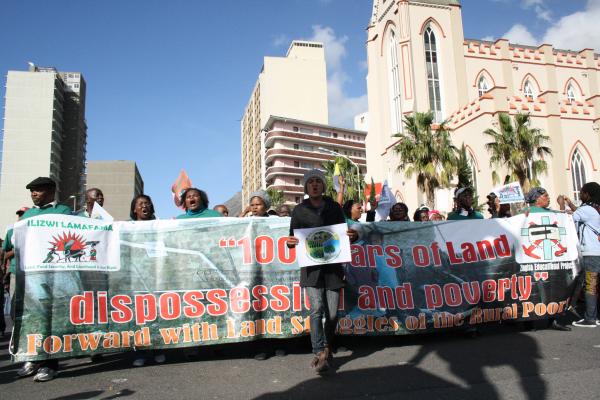New efforts for a united rural movement

Last Saturday, after three days of discussion, 300 members of multiple social movements marched in Cape Town and delivered a letter to the South African Government about land reform and land tenure.
In commemoration of the Land Reform Act of 1913, that established only 7% of the land for black people in South Africa, the African Studies department at the University of Cape Town organised the conference, Land Race and Nation in South Africa: a century of dispossession. “This conference, it’s not for scholars talking about land issues,” explained one of the organisers at the beginning of the conference. “It’s a platform for social movements.”
From Thursday to Saturday, about a dozen social movements and several NGOs from different parts of the country discussed their main concerns, the demands they have for the government and their frustration with the land policies. Among the movements were Tshintsha Amakhaya, the Food Sovereignty Campaign, Makukhanye, Mawubuye Land Rights Forum, Coastal Links, Siyazakha, Ilizwi Lamafama, Urban Food and Farming, iThemba Farmers, Mopani Farmers’ Union and the Rural People’s Movement.
“Only limited mobilisation and organisation around land has taken place since the end of apartheid,” says the final document produced by conference participants. “Struggles have been isolated and sporadic. But only mass mobilisation and sustained organisation will lead to meaningful land and agrarian transformation. We can no longer wait for the government. Action needs to be taken now. We will take action.”
In March, after a march to Parliament, the movements delivered the official declaration of the conference to a representative of the Department of Rural Development and Land Reform. This declaration presents 29 demands to the Goverment, including more consultation with the rural communities about land reforms, decriminalization of land occupations, more help for small-scale farming, and limiting the number of farms a company can own.
Support independent journalism
Donate using Payfast

Don't miss out on the latest news
We respect your privacy, and promise we won't spam you.

This article is licensed under a Creative Commons Attribution-NoDerivatives 4.0 International License.
